- Home
- Christie Golden
StarCraft II: Devil's Due Page 3
StarCraft II: Devil's Due Read online
Page 3
Butler obeyed, his eyes looking daggers. With the rifle, Tychus waved him back to stand over near the wounded man, who, if he wasn’t imagining things, looked grateful at having been spared death or a fate worse than.
“Thank you kindly, Marshal,” Tychus said, straddling the vulture. “Nice bike you got here.”
Without another word, Tychus roared off into the distance. A scant second later, he heard shots being fired, but they went wide. He grinned and turned the bike back toward the cave where he would rendezvous with Raynor.
“Busted your darling yet?” he asked Jim as he approached.
“Nope,” came Jim’s voice in his ear through the link. “Waiting for you to unload it, you big ox. What’s taking you so long?”
“Had to change bikes. You intent upon keeping that antiquated music box?”
“Hell yeah. I’m coming back for her. I got a feeling she’s going to come in real handy one day.”
“You know what’s handy?” Tychus said. “A shitload of credits to buy beer, cigars, and women.”
“You got me there.”
CHAPTER THREE
TARSONIS CITY, TARSONIS
Tarsonis was the habitat of the rich and famous, of captains of industry, of scientific geniuses and political masterminds. The gleaming towers of its capital rose proudly, glittering structures whose lines were elegant and harmonious. They created an unparalleled skyline, representing the pinnacle of the Confederacy’s technology: not just a city, but a super-city. This was where deals—of all varieties—were struck, and where someone emerged flush with victory and someone went home licking his wounds, only to come back for another round. Any new fashion, event, or technology was seen and applauded and courted first here by the Old Families of the Confederacy. Tarsonis in all its splendor was in its own way not quite real: a high-tech toyland where fortunes were lost and made daily and all could be mended with the right wine, or cigar, or drug, or whispered word. The very air of Tarsonis City—so unimaginatively named by the Old Families, who were not particularly imaginative themselves—capital of the planet, seemed to thrum with power and felt thick with intrigue.
There was, as was true of all things, a shadow side to the shining city. There were slums, and alleys, and people lying in them. Some were even alive. They had no beautiful homes with verandas, no servants. They did not dine on expensive imported food; sometimes they did not dine at all. In a place called the Gutter—a slum that ran beneath most of the shining city, even under the senate building, Nagglfar Hall, its marble-columned glory lit as brightly as if it were midday—there was filth, and death, and malice. Tarsonis was as ugly as it was glorious.
An elderly, white-haired man strode down the steps of Nagglfar Hall with a briskness that belied his years. Hale and tanned, with the practiced smile of the lifetime politician, Senator Westyn MacMasters emerged from its hallowed depths. He waved genially to the throngs assembled as if they were old friends, even though they were separated from him by lines of Special Service agents who wore expressions that indicated they didn’t give a damn about the forthcoming speech, only about protecting their charge. As MacMasters approached the podium decorated with the crest of the stars and bars of the Terran Confederacy, there were still more lights: those of cameras filming the event. A band was playing the Confederate anthem, “To the Eternal Glory of the Confederacy,” and doing so rather well. It finished to great applause, and MacMasters smiled out at the crowd before beginning his speech.
The man in the window of the building kitty-corner to the senate building knew Tarsonis City well. He had lived there until his late teens, viewing the city from a private terrace of a sixty-three-room mansion.
His name had once been Ark Bennet, son of Errol Bennet, of the Old Family Bennets, and he knew the man who was currently in his sights had dinner with him, played with his two sons. But the man in the window, who blinked steadily, regulated his breathing and practically his heartbeat as his world slowed down, was no longer that privileged, impossibly sheltered young man.
As a teenager, straining against the constrictions placed on him by the circumstances of his birth, he had slipped out while attending a conference with his father in the Hall of Reason. Wandering less than a mile from the safety of the university, Ark Bennet, scion of one of the Old Families, had been approached by an attractive young woman, drugged, and abducted, and had wound up conscripted into the military. At first, he had been frantic to alert his father about his situation. He had filed forms and affidavits again and again. It seemed to have no effect.
And then something happened. He found something he was good at—very, very good at.
Killing.
Ark had been the son of wealth and privilege, but there had always been something lacking in his life: a purpose, a direction. Something he could contribute. And in the military, this almost uncanny gift he had—he had heard it termed “the X factor,” an ability to seemingly slow the passage of time as he took his shots—had helped win battles. Even more importantly, it had saved the lives of friends.
Ironically, it was when he had ceased to worry or wonder if he would ever have a chance to go home that two men from the Military Security Service had arrived. He had lied at first, saying that he had faked the claim about his true self. But they had confronted him with irrefutable proof as to his identity. It was then that he had pleaded with them—tried to explain as best he could what his new identity, his new role in the world and his ability to protect people he now thought of as family, meant to him. And they had understood, and at that moment Ark Bennet was dead, and Ryk Kydd was permitted to live on.
But things had happened. Bad things—things that shouldn’t have happened. Some friends—many—had died, and he had parted ways with those who survived. Ryk Kydd was, and would always be, a sniper par excellence. Except now he wasn’t doing it for the military: he was doing it for himself. He had become a hired killer. There was no noble cause now, just the cold action of pointing the rifle, squeezing the trigger, and collecting his pay.
Although he had once known the man lined up in his sights, Kydd felt nothing for him one way or the other. He didn’t care about MacMasters’s politics, or his family, or the ramifications of the action about to occur. All he cared about was doing this thing he was so good at, using the gift some hellish angel had blessed him with.
“Fellow Confederates, I cannot tell you what joy it brings me to see so many of you turned out here tonight.”
Gently, like a lover caressing the object of his desire, Kydd placed his finger on the trigger. There was no computerized helmet to help him gauge the temperature, humidity, altitude, and barometric pressure. There were only slight modifications to the scope of the rifle itself. He had surpassed the need for most of that, experience and instinct coming together in a duet of death.
Carefully, Ryk started to squeeze the trigger.
“Not the best idea.”
At once Kydd spun around, but the intruder was too fast. There was a blur of motion, a swirl of a long coat, and a kick too swift to see, and Kydd’s rifle went flying out of his hands and clattered on the floor. Even as he lost his grip on it, Kydd was reaching for a dagger, which he brought down with all his strength on the arm clutching his coat.
It clanged on impact, the blade slipping off to the side uselessly. Startled, Kydd stared up at his attacker.
The man grinned wolfishly. “Cybernetic arm,” he said.
Quick as a thought, Kydd shrugged out of the black coat caught in that mechanical grip, dropping and sliding, scissoring his legs to try to trip the man. He was rewarded by feeling the man’s balance shift for an instant. His pleasure was short-lived, however, as the attacker kicked free, leaped straight up, and landed hard with one booted foot on Kydd’s left hand. Kydd arched his back, his mouth open in a silent scream. The stranger sprang back into a martial arts stance.
“One down,” the man said, grinning. His lean, angular face was decorated with a neatly trimmed goatee, and his teet
h looked startlingly white. He licked his lips in anticipation. “Three to go.”
“… and their grievances are perfectly just. Shiloh and other worlds have tirelessly given of themselves to feed the Confederacy, particularly during wartime. Given to the point where many, busy producing food for others, have nothing to eat themselves. To go hungry when—”
Kydd bolted upright. His left hand was completely useless, but his right still clutched the dagger. He let his gaze flicker to the rifle, and as his adversary’s eyes turned to follow his, he hurled the dagger straight and true, right for the man’s turned, exposed neck.
The cybernetic hand whipped up faster than the eye could follow, and closed down on the blade.
“Nice try.”
The next thing Kydd knew, white-hot pain seared his right hand, and he was lying on his back again. His own dagger had pinned his hand to the floorboards. He tried to pull free, to clasp the hilt, slippery with his own blood, with his smashed left hand, knowing that any second now the man would be on him to finish the job.
Except it didn’t happen. His would-be killer hung back, his white teeth gleaming, his eyes bright as he watched Kydd struggle. He was … enjoying this. Kydd had faced death before. He had the natural fear of such a thing, but as he glanced up at his attacker and saw that grin, a new kind of fear, hot and electric, blossomed painfully in his heart. The man grinned more widely.
Furious and frightened, his broken hand unable to grip the hilt sufficiently, Kydd leaned over and fastened his teeth on it, tasting the metallic tang of blood. Clutching the hilt with his teeth and simultaneously willing himself to pull it free, he succeeded. But what could he do with two ruined hands?
The only thing he could do. He scrambled to his feet and leaped forward in a flying kick.
Kydd’s feet met some sort of light armor, and even as the kick connected, the unknown man moved with the blow. Kydd fell hard on the floor.
“—to report that Farm Aid is doing exactly what it is supposed to: feed the loyal farmers whose sacrifices have placed them in this sad situation.”
Cheers and applause greeted the statement, but Kydd did not hear them. All his attention was focused on the man now descending upon him, his fake arm shooting out to close on Kydd’s throat so fast, it was a blur. The hand started squeezing, slowly, and with equal slowness the other man lifted Kydd off the floor. His thin lips peeled back in a grin.
“Somebody wants you dead,” the man continued in an almost conversational tone. “That’s fine by me. But he didn’t stipulate how you were to die. Nor how long it should take. That was left up to me to decide.” And then the man actually winked. “And we got all night.”
Terror threatened to close in on Kydd, but he fought it back. With the cybernetic arm, his assailant could have snapped his neck instantly. Instead, he was choosing to kill slowly, and that gave Kydd a fighting chance. Using the arm that was choking him as a support, he pressed down on it with his lower arms, lifted his legs up, and kicked out as hard as he could. His attacker stumbled back a step or two, but the grip around Kydd’s throat didn’t loosen.
“How’s it feel now, Ark? Having trouble getting air in? Feeling the blood pressure build up? Do you want to swallow?”
He couldn’t break the man’s grip, because it wasn’t a man’s grip—it was a cyborg’s—and panic surged up into Kydd as he struggled. He tried to lift his legs for another attack—the only option available to him—but he didn’t have much strength left, and they kicked ineffectively, swimming in the air until with his other arm the assailant almost casually slammed something hard against Kydd’s kneecaps. Distantly Kydd realized it was his own rifle.
Kydd couldn’t even howl in pain, the cry stifled by the implacable fingers closing, closing around him.
“—are honoring those Old Families who have seen the need and generously donated to those less fortunate than themselves, who might otherwise be too proud to ask for the help they so need. Those who would harm the Confederacy, such as the terrorist Sons of Korhal, who would take food from the mouths of—”
“Good,” the man murmured. He tightened his grip slightly. Kydd’s crippled hands flew to the false fingers, stupidly, uselessly trying to pry them from the slender human throat they were crushing. Blood thundered in his ears. His lungs labored to get something, anything—the merest puff of air—into them. Darkness started to melt in around his vision. He kept flailing, though, slapping his crippled hands against the metal substance of the human-looking arm. His legs moved ever more frantically, and he felt a warm wetness seeping into his crotch area.
The hand on his throat kept squeezing.
He felt heavy, too heavy to resist, to move. His eyes closed, and he felt himself being shaken, the grip loosening
“Damn it, not yet!” the man cried.
But it was too late. Kydd didn’t hear it, nor the growing passion in the senator’s speech, nor the wildly cheering crowd.
He didn’t hear anything at all.
* * *
For a long moment, the murderer simply stood in the room, alone with the corpse that five minutes ago had been a living, breathing human being, and who had been so beautifully, gloriously afraid. Sighing, he relaxed his fingers and let the body thump to the floor.
It hadn’t lasted nearly long enough. He gazed ruefully at his artificial hand, flexing and twiddling the fingers. “Don’t know my own strength sometimes,” he said. He picked up the rifle and took a moment more to caress it, thinking about how many times Kydd had held it, had fired it, had snuffed out a life in a heartbeat. Chances were the victim never knew it was coming.
Where was the fun in that?
He turned his attention to the body, got what he had come for, dropped it in a small satchel, and rose. He went to a corner of the room near the door and picked up a small device he had activated when he first entered, before he had revealed his presence to Kydd. His metallic hand closed about it protectively, and he smiled.
His job done, the killer turned and left.
“Let us not be dazzled by lies dressed up to look like truths. Let us remember that the Confederacy and the Old Families always—always—have our best interests at heart. Ladies and gentlemen … for freedom, for Farm Aid, and for the Confederacy!”
The bright lights from the rally spilled in through the window, casting their illumination on the floor and on what was left of Ryk Kydd, once known as Ark Bennet.
CHAPTER FOUR
RED MESA, NEW SYDNEY
WICKED WAYNE’S
The erratically blinking sign proclaimed the establishment to be Wicked Wayne’s, although the “n” and the “e” kept shorting out so that it more often read as “Wicked Way’s.” When Raynor was drunk, which usually happened a couple hours into any visit here, he found this beyond hilarious.
Even now, the sight made him smile as he and Tychus entered, climbing up the familiarly creaking wooden steps into a bar/gambling house/“dance hall” that was raucous, smelly, and lively. Jim loved the energy of this place. Unlike some places he and Tychus had visited, it did not have any pall of despair hanging over it like a thick cloud. No one came here to drown their troubles. People came here to have fun. Big Eddie—Jim and Tychus had been coming here for years, and Raynor still didn’t know the man’s last name—had an eye for finding and removing not only belligerent and possibly violent customers, but morose and melancholy ones as well. Wayne, for whom the place was named, once said a sad drunk was just as bad as a mad one, and neither would be tolerated in his establishment.
“Evenin’, Mr. Raynor, Mr. Findlay,” Big Eddie said. Every bit as large as Tychus, he was much better weathered, lacking scars or a broken nose. “Welcome back.”
“Hey, Eddie,” Raynor said, and slipped him a handful of credits. “When you’re off duty, enjoy yourself on me.”
Eddie chuckled. “I will at that, Mr. Raynor. Thank you.”
“Daisy working tonight?” asked Tychus.
Eddie’s smile, wide as the
sky, widened further, showing he still had all his teeth. “She most certainly is, but if she wasn’t, I’m sure she’d come in special for you.”
Tychus grinned.
Lots of people did things special for Jim and Tychus. They always spent their money freely and with good cheer, and Wayne, Eddie, Daisy, and the others looked out for them. Many a time had Butler and his deputies tried to surprise the two, and each time their plans had been foiled. Wicked Wayne’s looked after two of its best clients in every way.
The music was loud, with a heavy thudding boom that Jim could feel in his bones. The air was thick and gray with smoke, and the laughter was raucous and frequent. Tychus took a deep breath.
“That’s the smell of pleasure, Jim,” he said. “Only a couple scents missing: the sweat of the man who’s losing to you, and the perfume of the girl you’re slamming.”
“You’re a poet, Tychus.”
“Heh. Don’t I know it. Ah, there’s my girl.”
The stage was in the center of the place, with the bar on the left side and a VRcade off to the right. Several gambling tables were set up in the back, near an easy exit. On the stage now, wearing luminescent jewelry and enough scanty pieces of clothing so that they’d actually have something to remove for the customers, were the girls—and boys—of Wicked Wayne’s.
Tychus went right up to the chairs closest to the stage. He glared at the man currently seated within groping reach of the dancers. “You’re in my seat,” Tychus rumbled.
The man looked up at him. “Don’t have your name on it.”
“This does.” Tychus made a fist with his left hand and brought it close enough to the man’s face so that he could read the letters P-A-I-N—a letter tattooed on each finger.
Jim chuckled at just how fast the blood drained from the man’s face as his eyes flickered from the word to Tychus’s implacable expression. Without a word, he and his buddies picked up their drinks and relocated. Tychus settled into the chair, plopped his booted feet on another one, and grinned up at one of the gyrating dancers. Tall, red-haired, with legs up to here and breasts out to there, she wore infinitesimal scraps of fabric that barely concealed the gifts that nature and, Raynor always suspected, technology had given her. This was Daisy, Tychus’s favorite of all the girls at Wicked Wayne’s, and she gave him a big smile, a wink, and a shake of her finely curved behind as she continued to dance in heels so high and so spiked that Jim always thought they could be used as weapons.

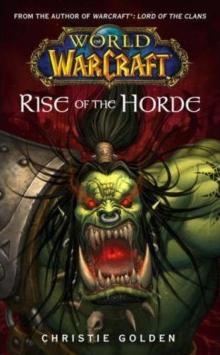 Rise of the Horde
Rise of the Horde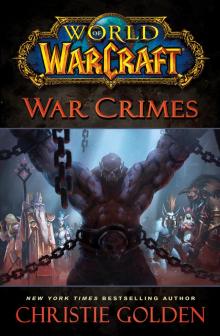 World of Warcraft: War Crimes
World of Warcraft: War Crimes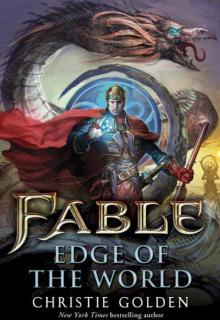 Fable: Edge of the World
Fable: Edge of the World Homecoming
Homecoming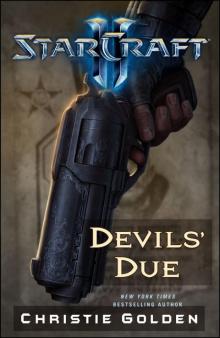 StarCraft II: Devil's Due
StarCraft II: Devil's Due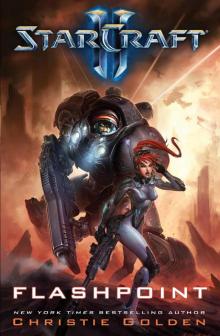 Starcraft II: Flashpoint
Starcraft II: Flashpoint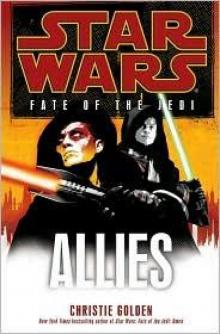 Allies
Allies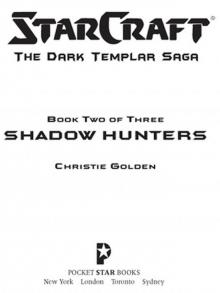 Shadow Hunters
Shadow Hunters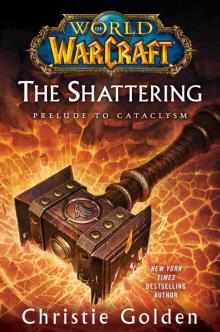 The Shattering: Prelude to Cataclysm wowct-1
The Shattering: Prelude to Cataclysm wowct-1 STAR TREK: VOY - Homecoming, Book Two - The Farther Shore
STAR TREK: VOY - Homecoming, Book Two - The Farther Shore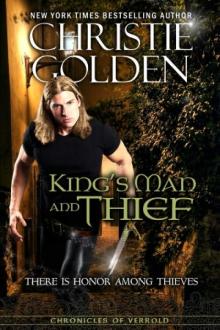 King's Man and Thief
King's Man and Thief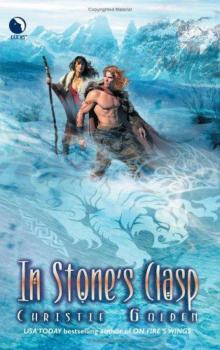 In Stone's Clasp
In Stone's Clasp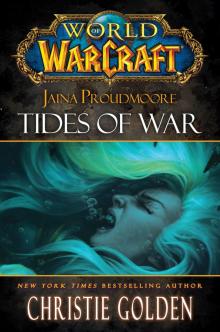 Jaina Proudmoore: Tides of War
Jaina Proudmoore: Tides of War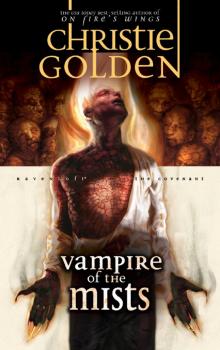 Vampire of the Mists
Vampire of the Mists Star Wars: Fate of the Jedi II: Omen
Star Wars: Fate of the Jedi II: Omen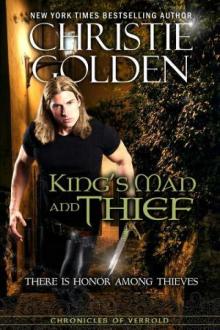 King's man and thief cov-2
King's man and thief cov-2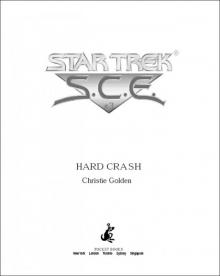 Star Trek
Star Trek StarCraft: Dark Templar: Twilight
StarCraft: Dark Templar: Twilight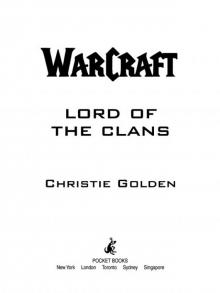 Lord Of The Clans
Lord Of The Clans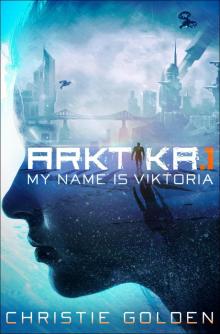 ARKTIKA.1 (Short Story)
ARKTIKA.1 (Short Story)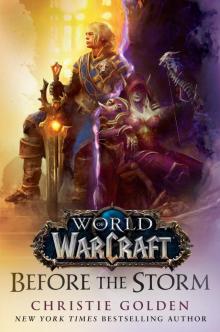 Before the Storm
Before the Storm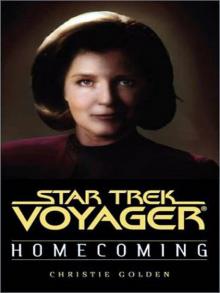 STAR TREK: VOY - Homecoming, Book One
STAR TREK: VOY - Homecoming, Book One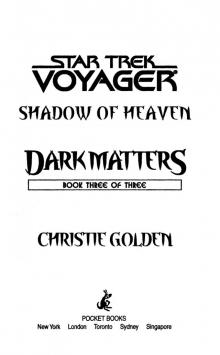 Shadow of Heaven
Shadow of Heaven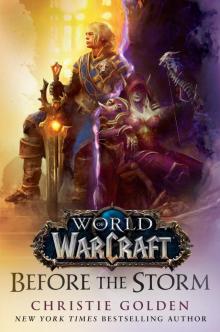 Before the Storm (World of Warcraft)
Before the Storm (World of Warcraft)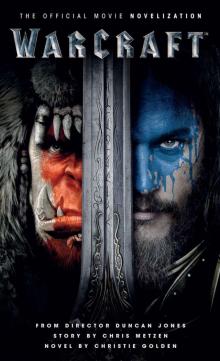 Warcraft Official Movie Novelization
Warcraft Official Movie Novelization Flashpoint
Flashpoint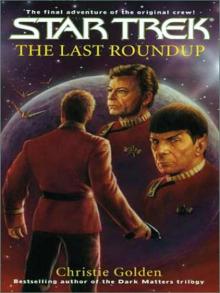 STAR TREK: The Original Series - The Last Roundup
STAR TREK: The Original Series - The Last Roundup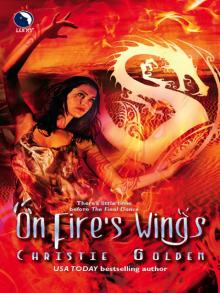 On Fire’s Wings
On Fire’s Wings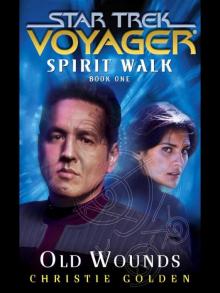 Spirit Walk, Book One
Spirit Walk, Book One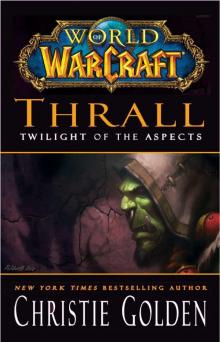 Thrall Twilight of the Aspects
Thrall Twilight of the Aspects Valerian and the City of a Thousand Planets
Valerian and the City of a Thousand Planets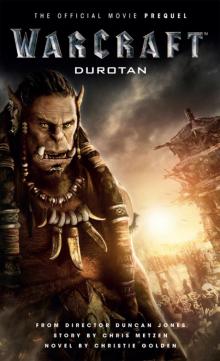 Warcraft
Warcraft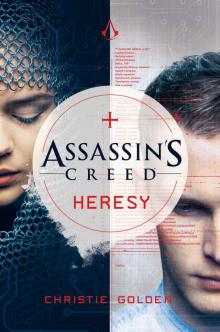 Assassin's Creed: Heresy
Assassin's Creed: Heresy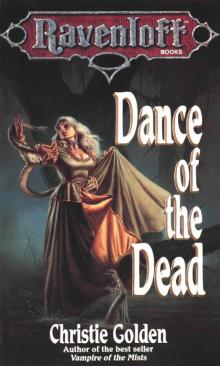 Dance of the Dead
Dance of the Dead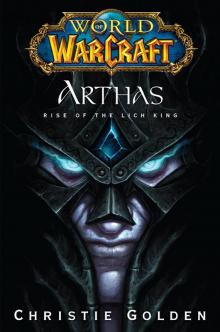 Arthas: Rise of the Lich King wow-6
Arthas: Rise of the Lich King wow-6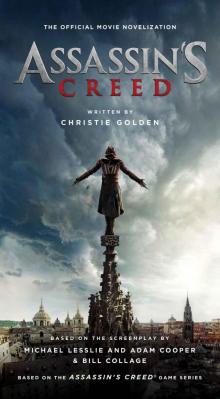 Assassin's Creed: The Official Movie Novelization
Assassin's Creed: The Official Movie Novelization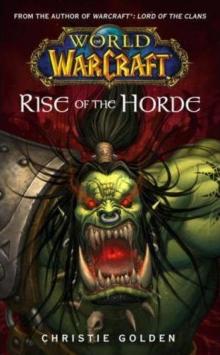 Rise of the Horde wow-2
Rise of the Horde wow-2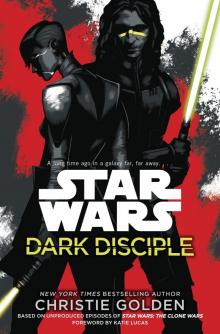 Dark Disciple
Dark Disciple Ghost Dance
Ghost Dance The Shattering
The Shattering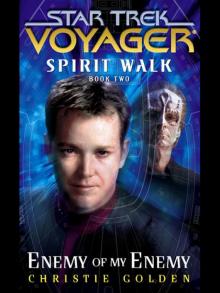 Spirit Walk, Book Two
Spirit Walk, Book Two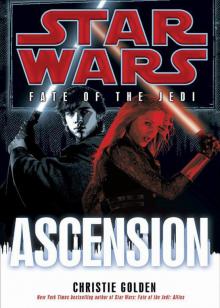 Star Wars: Fate of the Jedi: Ascension
Star Wars: Fate of the Jedi: Ascension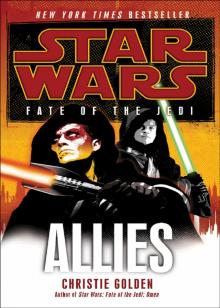 Star Wars: Fate of the Jedi V: Allies
Star Wars: Fate of the Jedi V: Allies The Enemy Within
The Enemy Within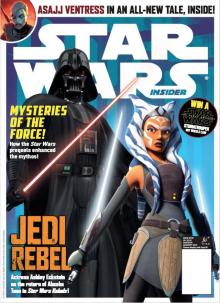 Kindred Spirits
Kindred Spirits The Farther Shore
The Farther Shore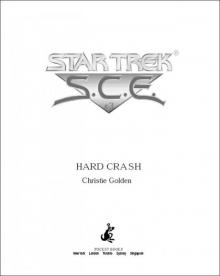 Star Trek: Hard Crash (Star Trek: Starfleet Corps of Engineers Book 3)
Star Trek: Hard Crash (Star Trek: Starfleet Corps of Engineers Book 3) Twilight
Twilight